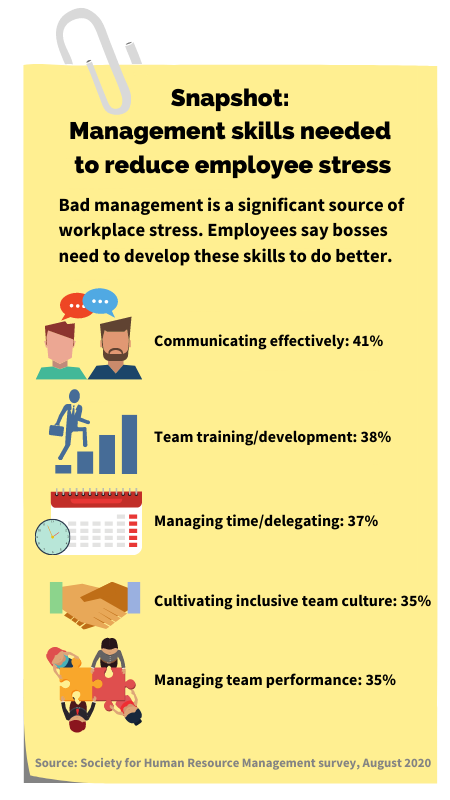Help your employees battle pandemic stress
 Juggling personal and professional obligations has never been an easy task. The demands inflicted over the past few months due to the pandemic, however, have caused unprecedented challenges to this balancing act—especially for workers with kids.
Juggling personal and professional obligations has never been an easy task. The demands inflicted over the past few months due to the pandemic, however, have caused unprecedented challenges to this balancing act—especially for workers with kids.
“Parents were stressed before COVID-19, and this extra stress of the unknown, business disruption, and being responsible for their children’s education has sent many questioning and exploring what needs to give,” says stress and resiliency strategist Beverly Beuermann-King, author of Stress Out! 52 Weeks to Letting More Life In.
For some people, this “what” might very well be their job. One in five working parents say that either they or their partner are considering leaving the workforce to care for their children, according to “Invest in Parents” —a report that is part of an initiative developed by Cleo, The Mom Project, PL+US (Paid Leave for the United States), and Happiest Baby to help working parents remain in and thrive in the workplace.
With findings showing full-time working mothers in two-parent households doing on average 22 hours of childcare a week during the pandemic in addition to maintaining their jobs, it’s easy to see why female workers in particular report both lower workplace engagement levels and poorer mental health in recent months. And as the well-being of workers suffers, so does that of companies. Experts estimate that working moms’ pandemic-related anxiety will cost the economy $341 billion.
Offering support
What can employers do to improve the situation and help staff members feel that they don’t have to choose between work and family? Take practical, empathetic measures to lend a hand.
“Support is the biggest predictor of our resiliency,” Beuermann-King says. “When workplace wellness programs address the mental, physical and social needs of the parent, they are more resilient. This resiliency allows them to be able to move forward through challenging times.”
Make certain employees know about resources available to them. EAPs (Employee Assistance Programs) offer free, short-term counseling and other measures designed to aid with mental health issues and emotional well-being. Likewise, keep workers on top of health insurance benefits relevant to the current situation, such as how to set up a virtual doctor’s appointment.
Showing respect for time can impact team members on a daily basis. Keep workloads and deadlines manageable, and give as early of a heads-up as possible when schedules or procedures change. Avoid lengthy meetings, and question who really needs to attend. If able, allow workers flexibility with their work hours. Focus on results over time logged. Employees do not need the stress of feeling like their every move is being monitored or that management is trying to “catch” them away from their desk.
Demonstrate concern for downtime, too. Calling without regard to the hour or sending emails at odd times sends a subtle expectation of being available 24/7. Encourage the use of PTO (paid time off) to rejuvenate now rather than saving all days for later when a “real” vacation involving travel might be possible. (This action also benefits organizations that are worried about the current stockpile of PTO causing problems down the line.) Some companies have tacked an extra day off onto holiday weekends such as Fourth of July and Labor Day to enable a longer break from work during these hectic times.
Check in regularly with staff members both as a group and one-on-one to see how things are going. Employees will appreciate the concern, and their feedback can pinpoint areas that still need addressing. Anonymous surveys also possess value as they allow people to admit problems without fear of judgment.
 Promoting self-care
Promoting self-care
Finally, realize that the last few months have been particularly trying for everyone, including managers. Be alert to the state of your own well-being, and take steps to lower your personal stress level.
As Beuermann-King notes, “Along with the basics of eating right, getting enough sleep, and knowing how to pause throughout the day, it is important to manage expectations—yours, your family’s, and your colleagues’. Ensure that they are realistic when it comes to workload and caregiving. Simplify the routines at home and delegate—ask for help and be open when you are struggling.”




